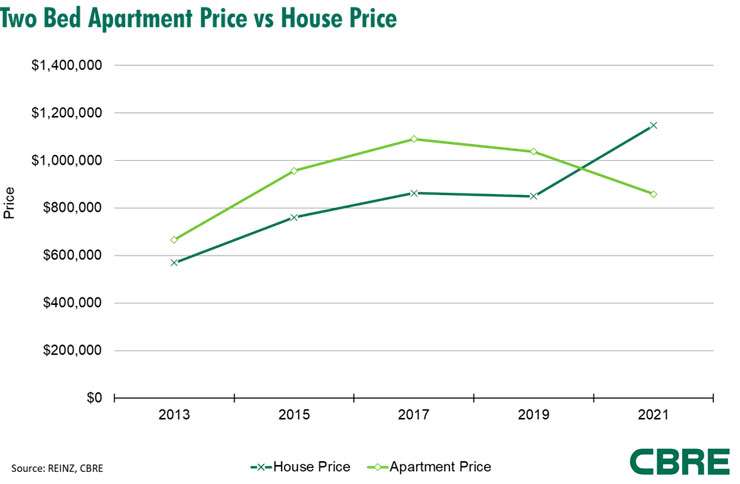New Zealand house prices have shot up 25% in the last 12 months, with first home buyers bearing the brunt of the heat in the housing market.
But there is one property type that has dropped in price, according to research from real estate agency CBRE New Zealand.
READ MORE: Find out if your suburb is rising or falling
CBRE NZ researchers have found that two-bedroom off-the-plan apartments in Auckland are $240,000 cheaper now than they were in 2017.
Start your property search
The data shows that the average price of two-bedroom units at presale is $860,000, the lowest since 2014 and only $200,000 more than the price eight years ago when land was significantly cheaper.
However, Tamba Carleton, associate director research at CBRE, said the data wasn’t a sign that the apartment market in Auckland had collapsed.
“It’s not like prices have all of a sudden crashed. What’s happened is the type of product on offer has changed to reduce the absolute price,” she said.
“There are two reasons behind it. One is that unit sizes have gotten smaller and two is use of the walk up construction methodology.
“This is a new low rise type of build and it’s a lot cheaper and easier to do than high rise so that’s why prices have come down.”
These two- to three-storey apartment builds, which are all over Auckland now, don’t need elevators and sprinkler systems, unlike four storey-plus builds where these are mandatory, and that makes them more feasible and cost-effective for developers to build – and they sell like hot cakes.
Off-the-plan apartment presales have tripled since the end of 2018, and the escalation in house prices since Covid has created a new environment for the new apartment market.
According to the CBRE NZ research, the average price of a two-bedroom off the plan apartment in Auckland in 2013 was around $650,000. By 2017 it was more than $1m.
Carleton said that prices had already started to flatten and while developers were putting out nice apartments they weren’t selling.
“That’s problematic. If you don’t sell, you don’t proceed so what developers did pretty quickly between 2013 and 2019 is change what they were doing in order to get presales and they did two things: reduce unit size, use walk ups.
“Kiwibuild had a strong influence on this, by the way. They have price caps and developers just had to be creative to meet these price caps.”
For the first time off plan apartment prices are cheaper than existing housing in Auckland.
That’s because back in the day the type of two bed product brought to market was often quite fancy and in nice central/fringey locations, Carleton said.

“Now, because developers are chasing presales and they have a better chance of getting them with lower priced apartments there is much greater volume of cheaper suburban, and its cheaper because one, smaller, and two, utilising walk up technology.”
Zoltan Moricz, CBRE NZ’s executive director research, said the need for apartments at the cheaper end of the scale was greater than ever and they are now a genuinely cost-effective option for home buyers.
“The group that has benefited most from the relative price changes of houses and apartments are those already on the housing ladder.
“While house price appreciation hasn't significantly lifted effective demand at the low end of pricing, it has lifted it at the higher end of pricing.”
This provides greater feasibility for higher intensity mid and high rise typologies that are more expensive to develop which in turn creates opportunities for the provision of a wider range of housing solutions, he says.
“It also provides diversity in product and tenure types as more expensive dwelling typologies can more effectively cross-subsidise other forms of housing within a development.”
Developers, however, needed to be careful to build to effective demand, he said.














































































